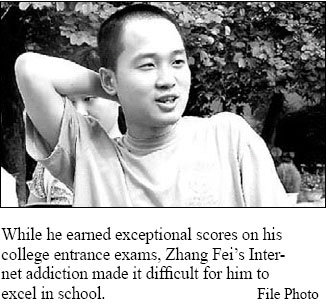| Home / Education / News | Tools: Save | Print | E-mail | Most Read |
| Student with Internet Addiction Offers Lessons |
| Adjust font size: |
Few question that Zhang Fei is of above-average intelligence. The
Last month, he took the exam again and was readmitted to Zhang's story has captured media attention throughout the country and sparked heated debate about how the country's system of higher education should handle such students. "He is a gifted student, plain and simple," says Zhang Fei's class advisor at the Sichuan Nanchong No 11 Middle School, Zhang Zhengfei. "But he does grapple with some serious challenges, such as an addiction to the Internet and computer games," the biology teacher explains. Zhang Fei first enrolled in So, Zhang returned home in 2004 and prepared to take the exam again the following year. To most people's delight, his science score of 703 ranked No But Zhang relapsed, and his addiction to computer games again caused him to perform poorly. "I seemed much older than most of my classmates. When the university called my mother to come to supervise my study, I felt more ashamed about myself," Zhang Fei said during a recent interview with China Central Television (CCTV). This February, he made the decision to leave Tsinghua after failing five courses. Still, Zhang wants to pursue his dream. He returned to the middle school again and changed his name to Zhang Konggu, which means " Zhang Zhenfei says his talented student has trouble getting along with others. "He needs help; he needs a mentor who can step into his inner world to help him design goals for his life and inspire him to live up to his potential." Last month, Tao Hongkai, a scholar with "I was shocked to see that such an intelligent student has suffered so much from an addiction to computer games," recalls Tao, who has become famous for helping people overcome computer-related addictions. Tao blames Zhang's addiction on the country's test-orientated educational system. "As long as a student can enter university, his or her family and even teachers would ignore the student's real needs," he explains. Tao says that while Zhang's IQ is very high, his EQ is low.
Consequently, he doesn't have a fully formed sense of responsibility to himself, his family or society. ( |
| Tools: Save | Print | E-mail | Most Read |
 |
| Related Stories |
|
